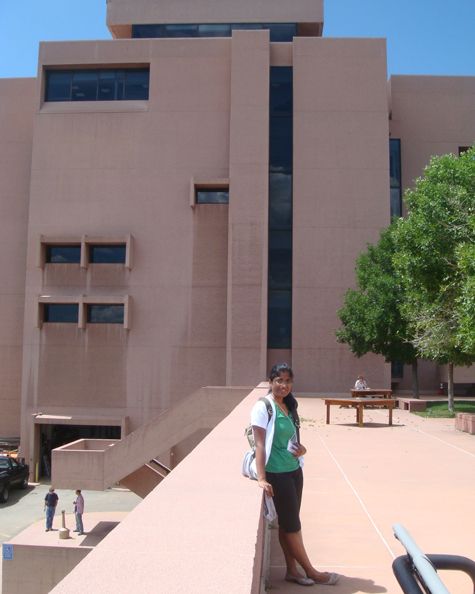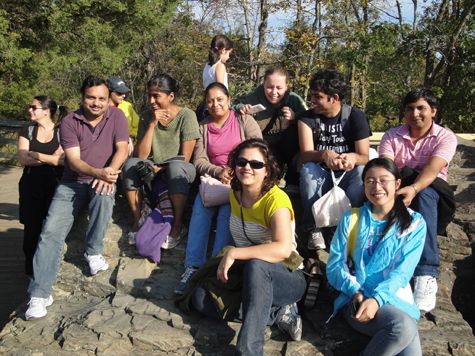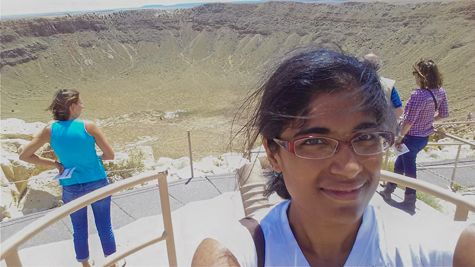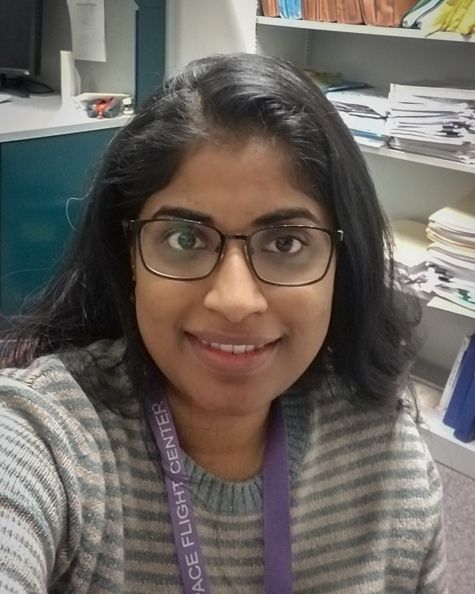Early Career Scientist Spotlight
Dr. Abheera Hazra (she/her/hers)
Climate and Hydro Scientist
Hydrological Sciences Laboratory (617)
What is your research focus?
I study the hydrologic forecast of extremes which helps people in some of the most vulnerable regions of the world. Hydrology is the study of water in the Earth's atmosphere, on its surface, and under its surface, and we apply it to study the extreme cases when either there is too much water or too little of it on the surface. I have always been passionate about applying scientific concepts to address real-world needs, and this research enables me to do just that. In this work, we apply an ensemble of meteorological forecasts to land surface models, which then provides us with a set of possible hydrologic forecast scenarios. We analyze these scenarios for extremes, such as floods or droughts, and use them as means to provide valuable insights to decision-makers and stakeholders working to address food insecurity challenges.
How did you end up working at NASA Goddard?
My PhD thesis and subsequent work delved into understanding precipitation signals in the tropics. I used diabatic heating as a proxy for precipitation, where diabatic heating refers to the process by which heat is added to or removed from the air in the atmosphere. This variable allowed us to study the precipitation signals in three dimensions and understand their evolution in space and time and how certain tropical signals, such as the El Niño Southern Oscillation (ENSO; a natural climate cycle that affects the temperatures of the ocean and the atmosphere and influences global weather patterns), could enhance forecasts of precipitation signals at various regions of the world. Building upon these results I worked on another project where I used my understanding of modeled and observed precipitation to improve the modeling/simulation of soil moisture, and thus its influence and interaction with land. I found the study of land-atmospheric interaction quite interesting and exciting, and soon joined the NASA Hydrologic Science Laboratory (HSL) to work on the Forecasting for Africa and the Middle East (FAME) project where some amazing state-of-the-art hydrologic modeling work was already underway. This project led to the development of NASA's Hydrological Forecast and Analysis System (NHyFAS), which successfully contributed to seasonal agroclimatology forecast for the Famine Early Warning Systems Network (FEWS NET). I am currently a part of the FEWS NET science team in the HSL leading the sub-seasonal to seasonal hydrologic forecast work.

Credit: Dr. Li Xu
What was your first big research achievement?
Developing a custom instance of NHyFAS by introducing the North American Multi-Model Ensemble (NMME) forecasts to the system and demonstrating how it improved the quality of the forecast has been one of my most significant research achievements. This system is currently known as the FEWS NET’s Land Data Assimilation System’s Forecast (FLDAS-Forecast), and it is a very important tool to many people, especially since it is one-of-a-kind application that delivers invaluable support to communities in need by providing agroclimatologists, and the decision-makers they work with, early warning information about forecasts of extreme hydrological events such as floods and droughts. We have a webpage which we update every month with the routine forecasts.

Credit: Unknown
What early career advice do you have for those looking to do what you do?
Once you have found the scientific path that truly excites you, be persistent and patient in pursuing your goals. You will encounter challenges and setbacks, but if you can stay committed and dedicated to your vision, it will be rewarding in the long run. Embrace the learning process, as it will bring you valuable experiences and knowledge that will contribute to your growth. Maintain focus on your objectives and set clear goals that are realistic and achievable, allowing you to track your progress and maintain motivation. While staying focused is crucial, remember that taking occasional breaks is equally important, so make sure you take time to relax and recharge.
What keeps you inspired by your work?
The fact that my efforts can make tangible impact on people in some of the most susceptible regions of the world and has the potential to help many more keeps me continuously inspired and motivated. My coworkers and friends are also a great source of inspiration to me as they cultivate a stimulating environment through insightful discussions where we share ideas and learn from each other's expertise, enriching our collective knowledge.

Credit: Abheera Hazra
Tell us about a unique or interesting component of your work-life balance.
I love traveling and hiking, I usually take time off to visit nearby places along the blue ridge mountains or venture further north to Philadelphia or New York. Engaging conversations about topics like science, travel, politics, and culinary delights with my family and close friends is also uniquely enriching. There are several artists in my family, so lively discussions about their creative expressions and exploring art next to them is a great way, I find, to balance the analytical tasks I carry out at work.
Credit: Mrinal Kar
What are your future research interests and goals?
My goal is to enhance and expand our hydrologic forecast products to more regions of the world and ensuring that they reach the hands of those who are most vulnerable and in need. I would also like to explore innovative technologies, data-driven methodologies, and cross-disciplinary collaborations through the use of Machine Learning/Artificial Intelligence and data-assimilation of remotely sensed data that can elevate the accuracy and efficacy of our forecasts. With emphasis on user-friendliness and accessibility using improved web interface, I would like to work on facilitating easy understanding and utilization of our forecasts by individuals and organizations at the forefront of disaster management and climate resilience.
Biography
Home Town:
Bangalore, India
Undergraduate Degree:
Bachelor’s in Physics, Chemistry and Mathematics, St. Joseph’s College, Bangalore, India
Post-graduate Degrees:
M.Sc. in Physics, Bangalore University, Bangalore, India
Ph.D. in Climate Dynamics, George Mason University, Virginia, USA


